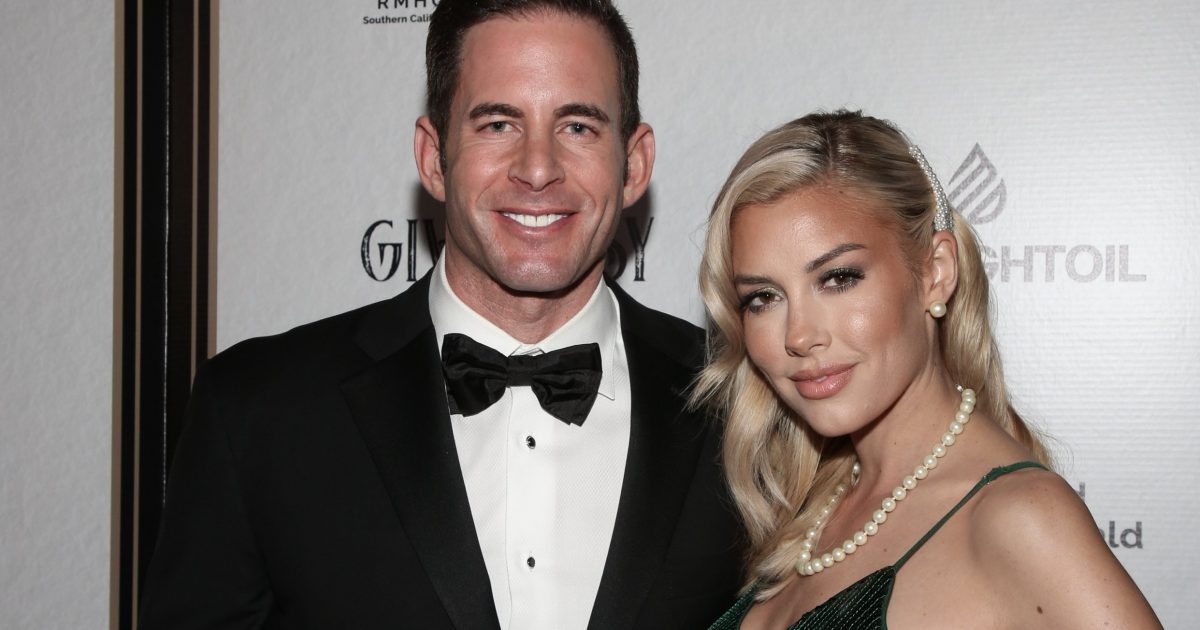Heather Rae El Moussa Opens Up about Wanting to Have Kids with Tarek
star Heather Rae El Moussa and HGTV icon Tarek El Moussa are building the life they want together. But sometimes that road can be challenging when previous cancer battles may be affecting fertility.
Tarek, 40, and Heather, 34, have been married since October 2021 and he has fondly said that they “[his] person, soul mate and best friend in one.” Previously, Tarek was married to his Flip or Flop co-star Christina Haack, 38. They later had two children – Taylor, 11, and Brayden, 6 – who were the two co-parents, despite going their separate ways romantically.
But now Heather and Tarek are trying to have children of their own. However, Heather has spoken openly about the couple’s struggles with fertility. Heather even spoke about how Tarek’s cancer battles have led to fertility problems during an interview on The Doctors television show.
“He had testicular cancer and had to take testosterone,” Heather told Dr. Ordon and fertility physician Dr. Gayane Ambartsumyan. “So I’d heard of Dr. A and I was actually shocked that I hadn’t known before — as a young couple who might want to have kids — that the testosterone he was taking could be blocking his sperm.”
But Heather did share some exciting news about their January fertility journey. During their latest round of in vitro fertilization, seven eggs were harvested (instead of the two they expected), and six of them “were good.” They also thawed four eggs from an egg hunt she did two years earlier, and three of them eventually made it. In total they now have nine embryos.
And in a recent Instagram post, Heather shared exactly why she wants to expand her family with Tarek.
“Since I started sharing my fertility journey with you, probably one of the #1 questions I get is, ‘why did you change your mind about having your own kids?’ she wrote in her caption. … my love for Taylor and Brayden is almost indescribable, it has helped me realize that I can be an amazing mother and that I really can!”
She then went on to share how much she loves being a “bonus mom” and shares her hopes for the future.
“I couldn’t imagine my life having nothing and creating with my man!” she wrote. “Besides, seeing @therealtarekelmoussa as daddy is unbelievable. He is so loving and devoted to them and such a wonderful father that I envisioned that we would have our own father. Tarek will move mountains to do everything he can to be at every school event, every game, he stands up for me when I need help with the kids even after a long day of work and filming and stress, he never sets anything up ask, will everything fall for me and them!
“Can’t wait to add to our family when the time is right.”
Tarek El Moussa’s Cancer Journey
El Moussa was diagnosed with thyroid and testicular cancer in 2013, calling it “the scariest year of” [his] live!” The same year, he co-starred with his then-wife Haack on the newly debuted HGTV show Flip or Flop — the show has since aired its final episode in 2022.
Interestingly enough, it was actually his time on Flip or Flop that led to his thyroid cancer diagnosis when a viewer noticed a lump on El Moussa’s throat. As a nurse, the viewer was determined to reach out to the network and share her concerns about his health.
After that diagnosis, El Moussa and his then wife “go through everything” [his] old medical records for other irregularities.” They found an irregular testicular exam from two years earlier, so just two months after his thyroid cancer diagnosis, he decided to look into it.
“I was in a building doing my thyroid stuff and said I was going across the street to get an ultrasound,” El Moussa told PEOPLE in 2017 on the day of the test. “I’ll never forget the doctor’s joke, ‘I hope you don’t have cancer!'”
Later that day, he found out he had testicular cancer.
“I go to the ultrasound and… [the technician and I] talking and having fun and suddenly he became very quiet,” said El Moussa. “I said, ‘What is it?’ I could see he was nervous and he said ‘Oh, I’m not a doctor.’ I said, ‘What do you mean?’ And he said, ‘Are you in pain? I think you are in pain and need to go to the emergency room.”
RELATED: ‘I Was in Shock!’ ‘Selling Sunset’ star Heather Rae Young on how Tarek El Moussa’s testicular cancer can cause fertility problems
“At that moment I knew something wasn’t right. Half an hour later they tell me I have cancer and try to sign me up for surgery. That was devastating.”
Tarek El Moussa beats both diseases
Fortunately, he would later beat both testicular and thyroid cancer. In a 2019 Instagram post, he shared his excitement of being cancer-free with Flip or Flop fans.
“Today I got the best news ever…I am cancer free and I am healthier than ever!!!!” he wrote in his caption. “This makes me so happy, not for me, but for my babies ❤️. I need to be healthy and alive for them!! (I’m in tears as I write this😭😭😭)
“They are my everything and they need their daddy! This news is so good because I live to be here for THEM!!”
Since winning both battles, he has been open about his cancer journey to raise awareness for the two cancers.
“A lot of people said they were being tested because I had my… [thyroid cancer] story,” he said.
He has even encouraged men to do self-checks for testicular cancer.
†[Movember’s website will] you learn how to do a self-check,” El Moussa said in another interview. “It’s very important because today there are people who are going to get testicular cancer, like it’s going to happen. And if they find it sooner, the chance of survival is so much higher.”
Understanding Testicular Cancer
The diagnosis of testicular cancer is rare, but it is the most common cancer in young men. Depending on the stage, the disease is considered extremely treatable. Treatment options may include chemotherapy and radiation, but often the first line of treatment is surgery to remove the testicle that contains the cancer cells.
Coping with the Embarrassment That Can Come with Testicular Cancer
Symptoms of testicular cancer can be subtle. Some people mistake the early symptoms, such as a small mass in their testicle, even as an injury. But when these signs go away, the cancer can grow and get worse.
RELATED: 10 Things I Wish I Knew Before I Was Diagnosed With Testicular Cancer
“It’s not uncommon for men to come in with masses on their scrotum and have inflammation of the scrotal wall; they develop pain as a result. A lump is the most common symptom of testicular cancer,” said Dr. Edwin Posadas, the medical director of the Urologic Oncology Program at Cedars-Sinai Cancer, previously told SurvivorNet.
dr. Posadas says some men may even notice blood in their ejaculate as a result of testicular cancer. “This symptom is less common, but it’s always bad,” he said.
Other symptoms may include:
Breast growth or pain Early puberty in boys Low back pain (a possible symptom of advanced testicular cancer) Shortness of breath, chest pain or cough (a possible symptom of advanced testicular cancer) Abdominal pain – (a possible symptom of advanced testicular cancer) Headache or confusion (a possible symptom of advanced testicular cancer)
dr. Posadas urges young men to seek medical attention if they have symptoms. “Most men under 40 tend not to think twice about seeing a doctor — they need to know to stand up for themselves,” he said.
Screening for testicular cancer
Testicular self-examination is one way to screen for this disease, says Dr. Posadas.
“It takes less than a minute,” Dr. Posadas previously to SurvivorNet. “Rub testicles through your fingers – looking for sores. Rub the top of the testicle, especially the delicate epididymis. (The epididymis is a tube at the back of the testicles that stores and carries sperm.)
“Don’t squeeze that so hard… [You should] look for a smoother feel; if you feel a hard lump there, you may need a blood test from a urologist. [Testicular cancer] is very curable, even if it is advanced.”
If you are concerned – go to the doctor
In an earlier interview with SurvivorNet, Dr. Bradley McGregor, clinical director of the Lank Center for Genitourinary Oncology at the Dana-Farber Cancer Institute, also emphasizes the importance of self-examination.
“It is recommended that men ages 15 to 55 perform a monthly self-exam to find any changes to detect the cancer at an early stage,” said Dr. McGregor. And if anyone notices any of the early symptoms, “should see their doctor immediately.” It is important to watch your body and contact a doctor if you notice anything unusual.
RELATED: Deadpool’s Call to ‘Tweak Your Tomatoes’ Saved This 31-Year-Old British Man’s Life; What you need to know about testicular cancer?
“Testicular cancer is common between the ages of 20-45, but it can occur at any age,” continued Dr. McGregor. “The greatest risk factor for testicular cancer is a history of cryptorchidism, an undescended testicle, where the testicle does not enter the scrotum before birth. Men with a family history of testicular cancer are also at increased risk. Lifestyle changes have not been shown to definitively reduce the risk of testicular cancer.”
Becoming a father after testicular cancer
Testicular cancer survivors may have problems with fertility after overcoming the disease, but this is not always the case. Treatment for this cancer can “affect hormone levels and may also affect your ability to father children after treatment,” according to the American Cancer Society, so you should discuss the potential effects with your doctor before starting treatment to understand all the options you have at hand.
One route people with the disease can take to store sperm in a sperm bank before starting treatment. But testicular cancer can result in a low sperm count, so getting a good sample can be tricky. If only one testicle remains after treatment, fertility returns after treatment — usually about two years after chemotherapy.
Becoming a Father After Cancer – The Story of Todd Rosenbluth
But it’s important to remember that testicular cancer doesn’t mean paternity isn’t ruled out in any way — and some people who have overcome testicular cancer may not see any problems at all.
Todd Rosenbluth, for example, became a father after testicular cancer. But when he and his wife wanted to start a family after his battle with cancer, it was difficult despite his cancer not being a problem.
Rosenbluth was diagnosed with testicular cancer in his late twenties after his wife urged him to attend his annual appointment with his doctor. He then underwent surgery to remove one testicle and overcame the disease, but later had fertility problems, despite his doctor telling him the couple’s struggle to have a child had nothing to do with his cancer.
“Unrelated to the testicular cancer, my wife and I had fertility issues,” Rosenbluth previously told SurvivorNet. “We had been trying to have a child for four years. They tell you it has nothing to do with the fertility issues at all. But in your head, if you have all these problems, and you did lose a testicle, you feel the guilt.”
But in the end everything went well. He and his wife had a beautiful son, Milo, in March 2018. Then Rosenbluth finally felt liberated from his past battle with cancer.
“The safest thing I felt with my testicular cancer was when my son was born,” he said.
Learn more about SurvivorNet’s rigorous medical assessment process.


Comments are closed.